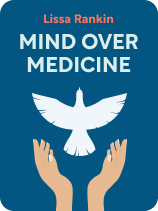

This article is an excerpt from the Shortform book guide to "Mind Over Medicine" by Lissa Rankin. Shortform has the world's best summaries and analyses of books you should be reading.
Like this article? Sign up for a free trial here.
What is Lissa Rankin’s Mind Over Medicine about? What is the key message to take away from the book?
In her book Mind Over Medicine, Lissa Rankin explores the mind-body connection and reveals our innate ability to promote self-healing. By proliferating positive beliefs and designing a fulfilling lifestyle, she says you can create conditions for healing relaxation and whole-body health.
Below is a brief overview of Mind Over Medicine: Scientific Proof That You Can Heal Yourself by Lissa Rankin.
Mind Over Medicine: Scientific Proof That You Can Heal Yourself
In her book Mind Over Medicine, Lissa Rankin argues that it’s possible to heal your physical ailments if you foster a healthy mind. By developing positive beliefs and living a balanced, fulfilling lifestyle, she claims you can create the conditions for relaxation and healing.
Lissa Rankin is a physician, author, and speaker. After graduating from medical school, she practiced modern western medicine for roughly a decade. However, after years of suffering from chronic illnesses despite modern medical treatments, Rankin began exploring cases of spontaneous remissions and holistic medicine. She discovered that our health depends on far more than prescription medicine and checking the conventional boxes of quality sleep, diet, and exercise. Instead, she found scientific proof that the healthiest people also have optimistic beliefs, good relationships, fulfilling jobs, creative outlets, and overall life satisfaction.
This realization inspired Rankin to accumulate research on the mind-body connection—this book (published in 2013) is the compilation of her research and strategies for self-healing. She’s also founded holistic health programs such as the Whole Health Medicine Institute and delivered a TEDx Talk on the subject of this book. Since the release of Mind Over Medicine, Rankin has published several books including The Daily Flame, The Fear Cure, and Sacred Medicine.
In this guide, we’ll discuss Rankin’s research on how the mind affects the body, and we’ll explore the techniques she offers for self-healing. Along the way, we’ll compare Rankin’s ideas to those of other books that examine the mind-body connection, such as When the Body Says No and The Upside of Stress.
Context: Rankin’s View on Western Medicine
Before jumping into the book’s content, we think it’s important to establish Rankin’s view on Western medicine as opposed to holistic healing, which is often considered “Eastern.”
Rankin proposes that we optimize our paths to healing by supporting the health of our minds in conjunction with modern medicine when it’s necessary. According to Rankin, there’s scientific evidence that our minds have a profound effect on our ability to prevent illness, relieve painful symptoms, and treat certain conditions such as allergies, colitis, diabetes, and Parkinson’s. However, Rankin says there is less data that supports the mind’s ability to cure serious and life-threatening illnesses. She speculates that this is because it’d be considered unethical to deprive participants with deadly diseases like cancer or heart disease of proven medical care in order to study the full potential of the mind’s ability to heal a body.
Additionally, Rankin emphasizes that modern medical treatments such as antibiotics and trauma care are necessary for their respective purposes. Thus, modern medicine should be utilized for all of its benefits to our healing, but we should also embrace our innate ability to heal ourselves.
Part 1: How Your Mind Influences Your Health
In the first half of this guide, we’ll discuss Rankin’s perspective on how exactly your mind and beliefs influence your physical health. We’ll first explore the power that placebos and nocebos have to heal you or make you sick. Then, we’ll explain how your beliefs induce stress or relaxation, which in turn affect your nervous system. Finally, we’ll discuss the modern epidemic of anxiety and depression and explain how your lifestyle dictates these conditions.
The Power of Placebo and Nocebo
Rankin explains that believing you received medical treatment (or didn’t receive treatment) affects your interpretation of how sick or injured you are as well as the physiology of your body. This has been proven by the placebo effect. For example, in one study cited by Rankin, half of the patients received knee surgery and the other half believed they received surgery but didn’t. The placebo group was sedated, had three incisions made on their knee, and afterward were shown a video of a procedure that they believed had been performed on them. One-third of these patients with the placebo operation experienced relief from their knee pain—the same amount of people who felt relief from the actual surgery.
The placebo effect isn’t just limited to your perception of pain—it can also alter your physiology. For example, placebos have helped people grow hair, lower their blood pressure, and even shrink cancerous tumors. In one case, Rankin explains that a patient riddled with tumors was treated with an experimental drug he believed would cure his cancer. Despite his dismal prognosis, this patient’s tumors vanished just ten days after receiving the experimental drug. Afterward, a scientific report was released saying that the drug administered to this patient was ineffective. When the patient heard this news, he lost belief in the drug and his tumors returned.
However, the patient’s doctor suspected that his positive belief in the drug was the key factor in his spontaneous improvement. So, the doctor issued this patient a placebo in place of the drug and told his patient it was a more effective version of the experimental drug he’d previously been administered. Again, the patient’s tumors vanished. Unfortunately, another report was later released proving the drug was completely ineffective. After hearing this news, the patient’s cancer returned and he died just a couple of days later.
Nocebo
Rankin’s story of the tumor patient illustrates that positive beliefs about treatment can promote well-being, but she adds that negative beliefs can have ill effects on your health. The latter is known as the nocebo effect—the opposite of the placebo effect—in which negative beliefs about the drug or treatment you’ve received lead to negative health outcomes. For example, Rankin cites one study that found that 30% of people who were given saline water and told it was chemotherapy lost their hair and vomited, both of which are common side effects of chemo.
As the placebo and nocebo effects demonstrate, your beliefs matter for your health. Rankin says this is also true for your general outlook on life. Research shows that a pessimistic mindset makes you more likely to suffer from illnesses like heart disease and it lowers your overall lifespan. On the other hand, an optimistic mindset helps you prevent illness, recover from illness faster, and live a longer life.
Stress and Relaxation Affect Your Nervous System
Related to positive and negative mindsets, Rankin says that stress is the most powerful mechanism behind the mind’s influence on physical health. Negative beliefs that perpetuate stressful feelings (such as fear, frustration, or loneliness) can trigger your fight-or-flight response, which releases a flood of energizing hormones to help you survive—two of which are adrenaline and norepinephrine. Although this stress response can empower us to fight or flee our way to safety in a life-threatening situation, Rankin says it can be destructive to our health when chronic:
- Frequent surges in blood pressure eventually damage your vessel walls, risking tears.
- The constant production of fatty acids and glucose for emergency energy causes a build-up of plaque which increases your risk of heart attacks.
- Overproduction of cortisol suppresses the immune system, making you more vulnerable to disease.
- Constant muscle activation and strain can lead to stiffness and structural problems. This is because when you trigger continuous stress responses, you never give your body a chance to relax and repair.
On the other hand, Rankin says when you proliferate positive beliefs, you induce relaxation rather than panic, which allows your body to focus its energy on maintenance and healing. This is because relaxation activates your parasympathetic nervous system (otherwise known as the “rest and repair” response), which counters your fight-or-flight response by helping your body return to resting, healing processes. For example, the relaxation response allows you to invest energy in digestion, reproduction, and repairing damaged cells. When you relax, your immune system also starts running on all cylinders again, which helps you fight and prevent disease more effectively.
Lifestyle Choices Can Trigger Anxiety and Depression
The health of your mind isn’t only affected by your beliefs, but also by your lifestyle. Rankin claims that we endure a lot of stress as a result of our modern, daily lives that our ancestors didn’t have to deal with. Lifestyle factors, such as work stress and loneliness, can cause anxiety and depression, which takes a toll on our bodies.
Rankin says that research shows that 60-90% of all doctor visits are related to stress. However, she explains that Western medicine tends to overlook the influence of lifestyle on our mental and emotional health and instead focuses on behaviors that affect our physical health, such as exercise, diet, and sleep. Although these physical habits are crucial to good health, Rankin argues that mental and emotional well-being are also essential to our physical health.
Happiness Releases Healing Hormones
When you’re feeling satisfied and appreciative of your life, your physical health reflects these positive feelings by relaxing and healing. Rankin says a happy mind boosts your general health, lowering your risk and severity of heart disease, lung disease, diabetes, and colds. She adds that happy people produce 50% more antibodies than unhappy people in response to flu shots. Happiness is also linked to greater longevity.
Rankin says that happiness reduces the number of stress responses you have, which keeps your immune system in better condition to repair cellular damage and fight off disease. In this way, happiness is preventative medicine. Although happiness has been shown to be an effective disease preventative, Rankin says the data showing its effectiveness for the treatment of already existing diseases is limited.
Happiness also boosts your physical health by increasing the release of neurotransmitters, such as dopamine and oxytocin:
- Dopamine drives our anticipation of happiness, such as when you’re looking forward to reuniting with an old friend or on the cusp of achieving a meaningful goal.
- Oxytocin is nicknamed the “cuddle hormone” because it’s the feel-good hormone that’s released when you’re snuggling with a loved one or playing with a child. One notable benefit of oxytocin is reduced inflammation in the body.
Part 2: Embrace a Relaxing Lifestyle That Promotes Healing
In Part 1, we learned how beliefs, lifestyle, and stress affect our physical health. In this section, we’ll explain how to reprogram your beliefs and design a lifestyle to promote relaxation and healing. We’ve organized Rankin’s advice under two categories: mastering your inner world and designing your outer world.
Master Your Inner World
To get your mind healthy and promote physical healing, Rankin says it’s crucial to master your inner world. To do this, she says you should embrace and reflect upon negative emotions, meditate, and develop your spirituality.
Normalize Negative Emotions, Shift Negative Beliefs
If you believe you shouldn’t experience negative emotions at all, when these emotions inevitably occur, you’ll worry about your worries, which will cause you to spiral into chronic stress. Rankin says because we’re not in total control of our thoughts and feelings, we should embrace sadness, anger, and fear. Acknowledging these negative emotions help us process them more effectively and allow them to pass. To embrace your negative emotions in a healthy manner, appreciate the purpose they serve you. For example, fear helps you survive by making you apprehensive and alert around danger.
While it’s healthy to acknowledge and embrace negative emotions, which are temporary, negative beliefs are more insidious because they induce chronic threat responses. To change a negative or self-limiting belief, Rankin says to argue against it by asking yourself the following questions:
- Is the belief true? If so, what evidence is there to support that it’s true?
- How does this belief make you feel?
- How would your life be different if you didn’t have this belief?
Then, replace your negative belief with a positive alternative. Consider using whatever the positive opposite of your negative belief is. For example, if your negative belief is that your sickness is the only valid excuse for canceling events you don’t want to attend, you could counter this belief by realizing that you can cancel plans by being honest with the people at those events.
Meditate to Become the Master of Your Mind
Among other benefits, Ranking recommends meditation as one tool for accepting your negative emotions. She defines meditation as a strategy for relaxation where you increase your awareness of your inner thoughts and the world around you and accept these things passively. Meditating helps you become more accepting of your negative thoughts and feelings, which allows you to relax and heal.
Rankin explains that meditation has been shown to have significant effects on physical health such as reducing blood pressure and strengthening your immune system. She also says that meditation activates several areas of the brain (the hippocampus and corpus callosum, to name two) that are connected to creativity, empathy, intuition, and happiness. In addition, the amygdala, the part of the brain responsible for fight-or-flight, settles down during meditation. All of these brain responses activate positive hormonal responses that aid the physical healing of your body.
While there are several ways to meditate, here are some of Rankin’s steps to help you meditate effectively:
- Get into a comfortable position.
- Close your eyes.
- Focus on your breath. Alternatively, Rankin says you can repeat and focus on a mental device—a prayer, mantra, or noise.
- Tense and relax each muscle from head to toe. As you do this, visualize your breath as a relaxing force that relieves tension wherever you find it in your body.
- Adopt an open, accepting attitude. If your mind wanders and begins planning or worrying about something you have to do, don’t suppress or get frustrated with these thoughts. Acknowledge them with love and then try to return your focus to your breath.
Develop Your Spirituality
Developing your spirituality will help you feel more grateful, find meaning in hardship, and live a peaceful life. All of these things help you relax and heal. People who consider themselves spiritual are happier, have better mental health, abuse fewer substances, and live longer. Rankin views spirituality as a perspective that finds sacred value in the things of life.
Here are a few of Rankin’s tips for embracing spirituality:
- Acknowledge what is sacred in your life. By assigning extraordinary qualities to everyday things, Rankin says you expand your awareness and transcend superficial aspects of reality, which makes you more open, grateful, and forgiving. This can help you overcome temporary troubles or grudges that cause negative emotions.
- Trust a higher power to guide you on your healing journey. Rankin defines a higher power as any loving force that has your best interest in mind. This could be a religious deity or your own body’s natural healing force. Belief in a higher power can help us find meaning in loss and suffering, mitigating the stress of grief and sorrow. Trusting that a loving force is guiding your healing can also relieve the stress that results from our efforts to control every step of the healing process.
- Follow a spiritual path that is true to you and helps you relax. Rankin explains that your spirituality can stress you out if it doesn’t align with your values and truth. For instance, a religious group you belong to might make you feel guilty or shameful of your lifestyle, which has been shown to cause you stress and potentially lead to illness. On the other hand, belonging to a spiritual group that makes you feel welcome, loved, and supported may help you relax and heal. Spiritual communities that gather based on shared beliefs have been shown to induce positive health effects such as better mental health, lower rates of cancer, and greater longevity.
Design Your Outer World
Along with mastering your inner world (your beliefs, mindset, and connection to a higher power), designing an outer world that helps you relax and experience joy will promote self-healing. According to Rankin, some of the most important parts of outer life that are under your control are your relationships, your career, and how you spend your free time. Improve these, and your body will thank you.
Improve Your Relationships
Earlier in this guide, we established that loneliness is detrimental to your health. But Rankin emphasizes that being around people isn’t enough to spare you from the negative effects of loneliness—you have to be around the right people. In fact, the quality of your relationships can be more influential to your health than your diet, exercise, and even whether or not you smoke. According to Rankin, healthy relationships trigger those positive hormones oxytocin and dopamine, which induce relaxation and healing.
Here are five of Rankin’s tips for forming good relationships:
1) Stay true to yourself. Other people’s expectations are constantly moving targets. So instead of trying to meet them, open yourself up to people who accept and love you as you are. As a result, you’ll form quality relationships.
2) Seek people you relate to. To find people who accept you as you are, find a group of people in your community who share interests with you.
3) Fix your sex life. Engaging in a healthy sex life offers innumerable benefits—from lower risk of cancer, stroke, and heart disease to having more youthful skin. Sex alone doesn’t offer these benefits, however—to reap the rewards, sex should serve as a deep connection between two partners who trust each other. Rankin says if anything about the sex causes you stress, such as dishonesty, distrust, cheating, or physical pain, then that sexual relationship can actually cause health problems. If this is the case, consider finding a different sexual partner or seek therapy to help with the issues.
4) Find doctors who care. Consult with doctors until you find “the one.” This doctor should take time to answer your questions and believe that you can get better. If you ask about “alternative” forms of treatment (for example, doing acupuncture in conjunction with physical therapy), a good doctor will give you advice but not dismiss anything outright or disparage other treatments that may help.
5) Be honest about your needs. If any important person in your life isn’t meeting your needs, tell them. Rankin says all relationships strengthen with honest communication about what is and isn’t working.
Find an Occupation You Love
Along with your relationships, Rankin says your occupation has a massive influence on your stress levels. For this reason, it’s important to work in a way that fulfills you and helps you relax. According to Rankin, your work doesn’t have to be a job you get paid for, but instead, it’s whatever you spend most of your time doing. This could be raising children or caring for your elderly parents.
As we touched on earlier in the guide, fulfilling work is beneficial to health but stressful work can be toxic. Work stress comes in many forms, but your body perceives them all as threats. Thus, it can trigger chronic stress responses that degrade your health over time.
Here are the different types of work stress to look out for:
- Overwork. As mentioned previously, working too hard can kill you.
- Conflicts with others. Abuse from superiors or colleagues can wreck your mindset and body.
- Moral dilemmas. Moral dilemmas occur when your job demands something of you that conflicts with your values. For example, if you’re a strict vegetarian, your mental health is likely to suffer if you work for a butcher.
- Feeling unheard. If you frequently voice your needs at work and your feelings are dismissed or go unmet, this isn’t a healthy environment.
- Chaos. Working in an environment where systems frequently fail or expectations aren’t clear is likely to put your brain into fight-or-flight mode.
If you recognize these sources of stress in your own workplace, set boundaries to avoid or mitigate them. For example, limit your work hours and respect your time off. In more drastic cases, don’t be afraid to leave your job for another. When this sounds implausible considering your responsibilities and debts, Rankin urges you to consider how the work stress is wearing on your body and shaving years off your life. It’s not worth it.
Express Yourself Creatively
Finally, Rankin says that expressing yourself creatively makes you feel happier and more relaxed, which soothes your stress response and promotes healing. Additional health benefits include better sleep, a lower risk for Alzheimer’s disease, and an increase in self-esteem.
The positive effects of creativity aren’t just limited to you. Creativity can enhance your work life, sex life, and so on. So, express yourself in whatever way brings pleasure to your life. This might be carpentry, cooking, knitting, painting or writing.

———End of Preview———
Like what you just read? Read the rest of the world's best book summary and analysis of Lissa Rankin's "Mind Over Medicine" at Shortform.
Here's what you'll find in our full Mind Over Medicine summary:
- How a healthy mind can heal physical ailments
- How our beliefs, our relationships, and our jobs affect our health
- How to improve the most important parts of your life






